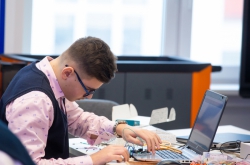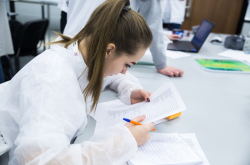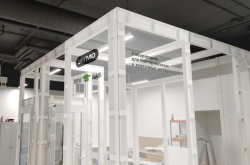Vladimir Vasilyev, Rector of ITMO University, and Konstantin Gorbenko, CEO of Prolab, have signed a partnership agreement at ITMO’s Infochemistry Scientific Center, under which the parties will continue to develop portable mini-laboratories and supply them to Russian schools. Prolab will design and maintain the laboratories, while ITMO University will train school teachers to conduct collaborative research. The project is primarily aimed at continuous professional programs. Mobile laboratories are expected to appear in a majority of Russian regions. High school students will be engaged in citizen science projects and help build databases for chemistry and materials science purposes, with a particular focus on national projects that revolve around Russia’s technological sovereignty.
“Both parties are equally invested in the project. On the one hand, we’re excited to collect data and utilize advanced computing methods to build machine learning models that will allow us to identify novel molecules more quickly and explain the behavior of complex systems. But on the other – such efforts enable school students to engage in science, gain insights into the profession, and make conscious career decisions. Together, we’ll develop a single ecosystem that will bring together data from varied scientific studies on infochemistry and novel materials,” said Ekaterina Skorb, the head of ITMO’s Infochemistry Scientific Center.

A cube laboratory. Credit: ITMO’s Infochemistry Scientific Center
The cube is a 3х3-meter mobile laboratory for cell and bacterial studies, with transparent walls and cameras that record and broadcast experiments onto screens mounted on the exterior of the laboratory. Inside, there is a laminar flow box (a workbench for working with biological objects in sterile conditions), a thermostat, a CO2 incubator, a microscope, a refrigerator, a microwave oven, and other equipment relevant to the needs of each particular school. If necessary, the cube can also be equipped with a robotic arm for automated experiments.
At the laboratories, high school students will have the opportunity to work on projects by ITMO’s Infochemistry Scientific Center and assist researchers in collecting big data, including for the following projects:
-
Identification and study of new cryoprotectants. Students will run experiments and learn how ice crystals form in the presence of various substances. The study will help build a database of new molecules.
-
Medical studies. The project’s objective is to produce protective coatings for remineralizing dental enamel, as well as develop an automated system for monitoring the growth and metabolic activities of microorganisms in real time. The technology will be useful for medical diagnostics, enzyme and antibiotic synthesis, and improving food safety control.
-
Analysis of the impact of nanostructures in polymer, hybrid, and biodegradable materials on cell growth. In the long run, the study will pave the way for advances in regenerative medicine.
-
Oil refining industry. ITMO University and the Gazprom School in St. Petersburg are planning a joint project aimed at reversing the environmental impact of oil and gas usage. For that purpose, school students will use lactic acid bacteria and their consortia to study contaminated water and soil.
“Such chemistry and infochemistry projects for school students are not common in Russia. Therefore, it’s not just about supplying equipment but also about training school staff to operate it and share their expertise with students. We’re certain that by working together, we will improve the quality of education and our project will hopefully continue in the long term while extending across Russia,” noted Dmitry Kinder, the commercial director of Prolab.

A cube laboratory. Credit: ITMO’s Infochemistry Scientific Center
The first cube lab was developed in 2023 by ITMO researchers in collaboration with Siberian Federal University, the Fund for Infrastructure and Educational Programs, and the research and manufacturing association Prolab. Amongst other studies, scientists at ITMO University are learning to program the behavior of cardiac muscle cells with biodegradable polymer products. Such laboratories can now appear not only at universities and research centers – but also in schools.





